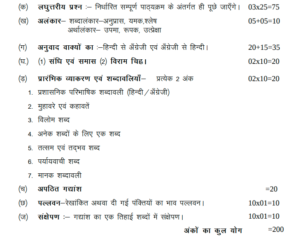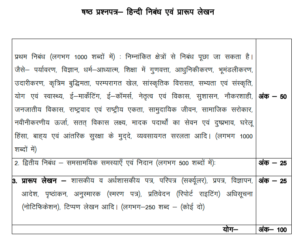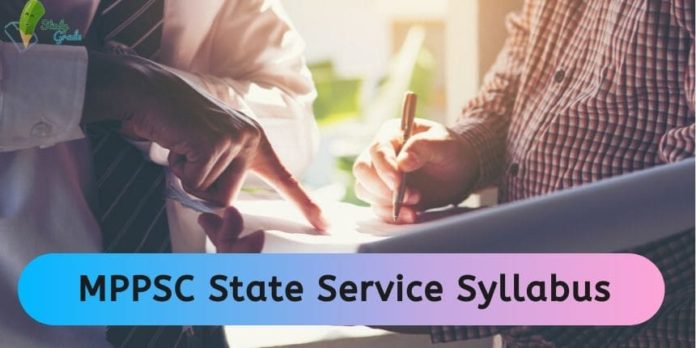MPPSC State Services Syllabus 2024 (Prelims & Main)– MPPSC releases the syllabus of MPPSC State Services 2024 exam. Students appearing for the MP civil services should have the complete details of MPPSC State Services 2024 Syllabus and exam pattern for prelims and main. MPPSC State Services Syllabus 2024 comprises important topics and subjects that candidates should prepare for the prelims and main exam. MPPSC State Services 2024 Syllabus is different for prelims and main exam.
Madhya Pradesh Public Service Commission (MPPSC) will conduct the MPPSC State Services Prelims in June 2024. MPPSC State Civil Services Examination 2024 comprises 02 successive stages, Preliminary Exam & Main Exam. To crack the MPPSC Recruitment exam, aspirants should have ample knowledge of the exam pattern and syllabus. Refer the below details to know the syllabus of MPPSC State Services 2024 and exam pattern-
(1) State Services Preliminary Examination (Objective types)– Only eligible candidates who have filled MPPSC State Service 2024 before the last date, can appear in the Preliminary Examination. This exam will be conducted to shortlist candidates for Main Examination.
MPPSC State Service Exam Pattern 2024 for Prelims
| Papers | Subjects | Duration | Marks |
| Paper 1 | General Studies | 2 Hours | 200 |
| Paper 2 | General Aptitude Test | 2 Hours | 200 |
Click Here to Download complete syllabus pdf
MPPSC State Service Syllabus 2024 for Prelims
| Units | Important Topics |
| History, Culture and Literature of Madhya Pradesh |
|
| History of India | Major features, Events and their administrative, Social and Economical Systems of Ancient and Medieval India. Social and Religious reform movements in 19th and 20th century. Independence struggle and Indian National Movement for Freedom. Integration and Reorganization of India after Independence |
| Geography of Madhya Pradesh | Forest, Forest Produce, Wild life, Rivers, Mountains and Mountain ranges of Madhya Pradesh. Climate of Madhya Pradesh. Natural and Mineral resources of Madhya Pradesh. Transport in Madhya Pradesh. Major Irrigation and Electrical Projects in Madhya Pradesh. Agriculture, Animal husbandry and Agriculture based industries in Madhya Pradesh. |
| Geography of World and India | Physical Geography :- Physical features and Natural regions. Natural Resources:- Forest, Mineral resources, Water, Agriculture, Wildlife, National Parks/ Sanctuaries/Safari. Social Geography:- Population related Demography (Population growth, Age, Sex ratio, Literacy) Economic Geography: – Natural and Human resources (Industry, Modes of Transport) Continents/Countries/Oceans/Rivers/Mountains of world. Natural Resources of World. Conventional and Non conventional Energy Resources. |
| Constitutional System of Madhya Pradesh | Constitutional System of Madhya Pradesh (Govern er, Council of Ministers, Legislative Assembly, High Court). Three-tier System of Panchayati Raj and Urban Administration in Madhya Pradesh. |
| Economy of Madhya Pradesh | Demography and Census of Madhya Pradesh. Economic Development of Madhya Pradesh. Major Industries of Madhya Pradesh. Castes of Madhya Pradesh, S chedule Castes and S chedule Tribes of Madhya Pradesh and Major Welfare Schemes of State |
| Constitution Government and Economy of India | Government India act 1919 and 1935. Constituent Assembly. Union Excutive, President and Parliament. Fundamental Rights and Duties of the Citizens and Directive Principles of State policy. Coustitutional Amendments. Supreme Court and Judicial System. Indian Economy, Industrial Development and Foreign trade, Import and Export. Financial Institutions- Researve Bank of India, Nationalised Banks, Security and Exchange Board of India (SEBI), National Stock Exchange (NSE), Non Banking Financial Institutions |
| Science and Technology | Basic Principles of Science. Important Indian Scientific Research Institutions and Their achievements, Satellite and Space technology. Environment and Biodiversity. Ecological System. Nutrition, Food and Nutrient. Human Body. Agricultural Product Technology. Food Processing. Health Policy and Programmes. Pollution, Natural Diasasters and Managemen |
| Current International and National Affairs |
|
| Information and Communication Technology |
|
| National and Regional Constitutional / Statutory Bodies |
|
MPPSC State Service Prelims Syllabus 2024 for General Aptitude Test
- Comprehension
- Interpersonal skill including communication skill
- Logical reasoning and analytical ability
- Basic numeracy (numbers and their relations, order of magnitude ect.-Class 10th level)
- Decision making and problem solving
- General mental ability
- Data interpretation (-Class 10th level)
- Hindi Language Comprehension Skill (Class 10th level)
Note:- Question relating to Hindi Language Comprehension skill of Class 10th level.
MPPSC State Services Exam Pattern 2024 for Mains Exam
The number of candidates to be admitted to the Main Exam will be about 15 times the total number of posts to be filled through MPPSC State Civil Services exam 2024. This examination comprises of two parts Written Exam & Interview. Candidates who qualify the written examination will be called to attend the Interview. Complete MPPSC State Services 2024 Exam pattern & syllabus is provided here. The written exam will consist of 6 papers of conventional essay type questions
| Papers | Subjects | Duration | Marks | Exam Medium |
| Paper 1 | History, Geography | 3 Hours | 300 | Hindi & English |
| Paper 2 | General Studies, Economics and sociology | 3 Hours | 300 | Hindi & English |
| Paper 3 | Science & Technology | 3 Hours | 300 | Hindi & English |
| Paper 4 | Philosophy, Psychology and Public Administration | 3 Hours | 200 | Hindi & English |
| Paper 5 | General Hindi & Grammar | 3 Hours | 200 | Hindi |
| Paper 6 | Hindi Essay Writing | 2 Hours | 100 | Hindi |
MPPSC State Service Syllabus 2024 for Main Exam
MPPSC State Service 2024 Syllabus and exam pattern help in gathering a better understanding of exam so that you can prepare the better strategy to crack the exam.
MPPSC State Service Mains Syllabus 2024 (History and Culture)
| Units | Chapters |
| Unit 1- Indian History | Economic, Political, Social and Cultural History of India from Harappan civilization to 10th Century A.D |
| Unit 2 |
|
| Unit 3 |
|
| Unit 4- Dynasties of Madhya Pradesh |
|
MPPSC State Service Mains Syllabus of Geography
| Units | Chapters |
| World Geography |
|
| Geography of India |
|
| Geography of Madhya Pradesh | Major Geomorphic Regions with special reference to Narmada Valley and Malwa Plateau. Natural vegetation and climate. Soil:- Physical, chemical and biological properties of soil, soil formation process, problems of soil erosion and soil degradation, problem soil and methods of its reclaimation, soil conservation planning on watershed basis. Mineral and Energy Resources:- Types, distribution and uses. Major Industries: Based on agricultural produce, forests and minerals. The Tribes of State with particular reference to vulnerable tribes |
| Water and disaster management | Drinking Water:- Supply, factors of impurity of water and quality management. Water management. Ground water and water conservation. Natural and Man-made disasters, Concept and scope of disaster management, specific hazards and mitigation. Community planning: Resource mapping, relief and rehabilitation, preventive and administrative measures, safe construction. Alternative communication and survival efficiency. |
| Advanced Techniques in Geography |
|
MPPSC State Service Mains Syllabus 2024 (General Studies)
| Units | Chapters |
| Unit 1 |
|
| Unit 2 | Election Commission of India, Comptroller and Auditor General of India, Union Public Service Commission, Madhya Pradesh Public Service Commission and NITI Aayog. Role of caste, religion, class, ethnicity, language and gender in Indian politics, Political parties and voting behavior in Indian politics, civil society and Public movement, National integrity and security issues. |
| Unit 3 | Public participation and local government (with reference of 73rd and 74th amendment to the Constitution) Accountability and Rights:- Competition Commission, Consumer Forum, Information Commission, Women’s Commission, Human Rights Commission, SC / ST / OBC Commission, Central Vigilance Commission. Features of democracy:- Political Representations, Participation of Citizens in the Decision making Process. Community-based organizations (CBO), Non Government Organizations (NGOs) and Self-help groups (SHG). Role of Media and Problems (Electronic, Print and Social) |
| Unit 4 | Indian Political Thinkers Kautilya, Mahatma Gandhi, Jawaharlal Nehru, Sardar Vallabh Bhai Patel, Ram Manohar Lohia, Dr.B.R.Ambedkar, Deendayal Upadhyaya, Jayaprakash Narayan |
| Unit 5 | Administration and Management:- Meaning, nature and significance, Role of public administration in the developed and developing societies, Development of Public administration as a subject, Modern Public Administration, Principles of Public Administration. Concepts:- Power, Authority, Responsibility and Delegation. Theories of organization, steps and area of control and unity of command. New dimensions of public management, management of change and development administration |
MPPSC State Service Mains Syllabus 2024 (Economics and sociology)
| Units | Chapters |
| Unit 1 | Issues and initiatives in the field of agriculture, industry and services in India. Measurement of national income in India. Functions of Reserve Bank of India and commercial banks, financial inclusion, monetary policy. Characteristics of good taxation system- Direct tax and indirect taxes, subsidies, cash transaction, fiscal policy. Public distribution system, current trends and challenges of the Indian economy, poverty, unemployment and Regional imbalances. India’s international trade and balance of payment, role of Foreign capital, multi-national companies, Foreign direct investment , import-export policy, International Monetary Fund, World Bank, Asian Development Bank, World Trade Organization, ASIAN, SAARC, NAFTA AND OPEC, |
| Unit 2 | With reference to Madhya Pradesh Major crops, holdings and cropping patterns, Social and physical environmental impact on producation and distribution of crops, Issues and challenges related with quality and supply of seeds and manure, farming practices, Issues and challenges of horticulture, poultry, dairy, fisheries and husbandry etc. Problems and challenges related to agricultural produce, transportation, storage and marketing. Welfare Schemes of Agriculture. Contribution of Service Sector. Infrastructure and resources of Madhya Pradesh. Demographic scenario of Madhya Pradesh and its impacts on the economy of Madhya Pradesh. Industrial sector, growth, trends and challenges. Availability of skilled human resources, employability and productivity of human resources, Different trends of employment. |
| Unit 3 | Human Resource Development Education:- Elementary education, Quality of Higher, Vocational, Technical and Medical Education. Issues related to girl’s education. Issues related with following social classes and their welfare programmes:- Differently abled classes, Senior Citizens, Children, Women, Under privileged classes and Displaced groups arising out of developmental projects. |
| Unit 4 | Elements of social harmony, concept of civilisation and culture. Features of Indian Culture. Rituals: Various references, Caste system. Ashram, Purushartha, Chatushtya, Religion and sect influences on society and methods of marriage. Community Development Programme, Extension Education, Panchayati Raj, Role of Non Governmental Organizations (NGO’s) in Community Development. Recent trends in Voluntary sector regarding Rural Development, Family Court. |
| Unit 5 | Population and Health Problems, Health Education, and Empowerment, Family Welfare Programmes, Population Control. Status of Tribes in Madhya Pradesh, Social Structure, customs, Beliefs, Marriage, Kinship, Religious Beliefs and Traditions, Festivals and Celebrations in Tribes. Women Education, Family Health, Vital Statistics, Causes and effects of malnutrition, Goverment Programmes of supplementary nutrition, Technological inventions in the field of Immunology, Remedies (Treatment and Cure) of communicable and non communicable diseases.
World Health Organization |
MPPSC State Service Mains Syllabus 2024 (Science & Technology)
| Units | Chapters |
| Unit 1 | Work, Power and Energy- Gravitational Force, Friction, Atmospheric Pressure and Work. Units and Measurement, Example from daily life. Speed, Velocity , Acceleration Sound:- Definition, Medium of Propagation, Audible and Inaudible sound, Noise and Music. Terminology related with Sound:- Amplitude, Wave Length, Frequency of Vibration. Electricity:- Different types of Cell, Circuit. Magnet:- Properties, preparation and uses of artificial magnet Light:- Reflection, Refraction, Mirrors and Lenses , Image Formation, Heat: Measuring Temperature, Thermometers, Transformation of Heat |
| Unit 2 | Element, Compound and Mixture:- Definition, Chemical Symbols, Properties, Availability on the Earth, Material:- Metals and Non Metals, Periodic Table and Periodicity. Atom, Atomic Structure, Valancy, Bonding, Nuclear Fusion and Fission. Acids, Bases and Salts. pH Value Indicators. Physical and Chemical Changes. Chemistry in daily life |
| Unit 3 |
|
| Unit 4 |
|
| Unit 5 | Numbers and its type, Methods of Unit Measurement, Equations and Factors, Profit loss, Percentage, Simple and Compound Interest, Ratio Proportion. Statistics:- Probability, Measurement of Central Tendency (Mean, Mode, Median) and Variance, Types of Sampling. |
| Unit 6 | Communicable diseases and their Prevention. National Vaccination Programme. Primary Knowledge of AYUSH – Ayurveda, Yoga, Unani, Siddha, Homeopathy Health Related Important Welfare Schemes of Central and State Government. Major Health Organizations of Central and the State Government. |
| Unit 7 |
|
| Unit 8 |
|
| Unit 9 |
|
| Unit 10 |
|
MPPSC State Service Mains Syllabus 2024 (Philosophy, Psychology & Public Administration)
| Units | Chapter |
| Unit 1- Philosophers/Thinkers, Social Reformers | Socrates, Buddha, Plato, Charwak, GuruNanak, Aristotle, Tulsidas, Ravindra Nath Tagore, Mahavir, Acharya Shankar, Kabir, Raja Ram Mohan Roy, Savitribai Phule, Maharshi Arvind, Swami Dayanand Saraswati, Swami Vivekanand, and Sarvpalli Radhakrishnan |
| Unit 2 |
|
| Unit 3 |
|
| Unit 4 |
|
| Unit 5 | Case Studies |
MPPSC State Service Mains Syllabus 2024 for Hindi

MPPSC State Service Mains Syllabus 2024 for Hindi Essay

Stay Connected to StudyGrades for Latest Updates on MPPSC State Service Syllabus 2024!.






